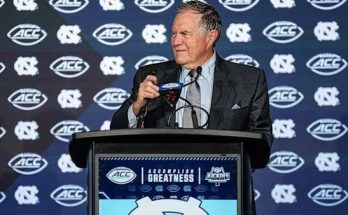When Jayson Tatum stepped onto the floor as a 19-year-old rookie for the Boston Celtics in 2017, few could have predicted just how quickly he would ascend to the echelon of NBA greatness. Yet here we are, in 2025, and the league has already anointed him one of the Top 100 NBA players of all time—before he’s even reached his 28th birthday. This isn’t a case of premature celebration or regional bias. This is recognition born out of consistent excellence, playoff heroics, leadership maturity, and a resume that continues to grow with each passing season.
Tatum’s journey to all-time greatness has been one marked by a steady rise, not a meteoric flash. His development has followed a disciplined arc, reminiscent of the greats who valued evolution over instant stardom. In his rookie year, thrust into the playoff spotlight after injuries sidelined Kyrie Irving and Gordon Hayward, Tatum didn’t flinch. He dazzled fans and stunned opponents with his poise, dropping 20-point performances with ease and even dunking on LeBron James in the Eastern Conference Finals. That was the first sign—a teenager taking on legends and thriving under postseason pressure.
In the years that followed, Tatum sharpened every facet of his game. His scoring touch grew deadlier, morphing into one of the league’s most versatile offensive arsenals. He could drive, post up, pull up from mid-range, and splash threes with efficiency. He rebounded like a big and passed like a guard. Defensively, he embraced the challenge of guarding elite wings and never took possessions off. More importantly, he became the face of the Celtics—a franchise rich in basketball royalty—with a quiet charisma and fierce competitiveness that mirrored past legends like Paul Pierce and Larry Bird.
The accolades came steadily, not in a flurry, which made them all the more legitimate. Multiple All-Star selections, All-NBA First Team honors, deep playoff runs, a Finals appearance, and ultimately—his crowning achievement—a 2024 NBA championship and Finals MVP. That title didn’t just validate Tatum’s skill set; it elevated his status among the game’s immortals. He was no longer just an elite player; he was a winner. And in Boston, a city where banners and rings matter more than anything, that cemented his place in history.
What truly sets Tatum apart, though, is his rare blend of patience and killer instinct. Many stars today opt for superteam scenarios or bounce from franchise to franchise in search of an easier path to glory. Tatum stayed the course. Through injuries to teammates, coaching changes, front-office shifts, and repeated heartbreak in the Conference Finals, he never demanded a trade. He never threw teammates under the bus. He never lost faith in the Celtics’ blueprint. That loyalty has become increasingly rare in the modern NBA—and it has endeared him to purists who long for a Kobe-like figure who bleeds one team’s colors.
Kobe Bryant’s mentorship of Tatum is no secret. The two shared workouts, texts, and philosophical discussions about what it means to be great. That tutelage paid dividends. Tatum, like Kobe, became obsessed with refining his craft. He watched hours of film, studied footwork, and added counters upon counters to his offensive game. He absorbed criticism and turned it into fuel. He didn’t just want to be good—he wanted to be great, and more importantly, remembered. That mindset, that hunger, is what separates the Top 100 from the talented.
Tatum’s inclusion in the NBA’s Top 100 of all time isn’t just a nod to his stats—though those are staggering. He already has over 15,000 career points, 4,000 rebounds, and 3,000 assists. He’s averaged over 27 points per game in three different seasons and has countless 40-point games under his belt. But greatness isn’t always found in box scores. It’s often visible in moments—the clutch fadeaway against Milwaukee, the game-saving block versus Miami, the 50-point playoff explosion in a must-win game against Philadelphia. These moments live forever, burned into the memory of fans and historians alike.
Beyond the numbers and highlights, Tatum’s impact on culture and representation matters. As a Black father who proudly brought his son Deuce along for the ride throughout his NBA journey, Tatum has shown a different side of superstardom. He’s made fatherhood cool in the NBA. He’s been a visible reminder that you can be a killer on the court and compassionate off it. That duality—of dominance and dignity—has made him a role model not just for future ballers, but for an entire generation watching how to handle fame, pressure, and responsibility.
There’s also something to be said about timing. Tatum’s rise has come during one of the most competitive eras in NBA history. He’s shared the court with LeBron James, Kevin Durant, Stephen Curry, Giannis Antetokounmpo, Nikola Jokic, Joel Embiid, and Luka Dončić. The league is deeper than ever, yet Tatum has consistently stood out, often besting those very names in direct matchups. Being great when your competition is mediocre is one thing. Being great when you’re surrounded by other giants is another. It speaks to the kind of rare, era-defining talent that Top 100 status demands.
If there was ever a question about Tatum’s place in the pantheon of basketball greats, the 2024 postseason answered it resoundingly. His leadership, resilience, and breathtaking performances guided the Celtics through a gauntlet of contenders to raise Banner 18. And unlike other stars who coast once they win their first title, Tatum doubled down. He entered the 2024–25 season in peak shape, leading the league in scoring through stretches, dishing out career-high assists, and anchoring a Celtics defense that’s been the best in the NBA. His hunger hasn’t faded—it’s intensified.
Tatum’s placement in the Top 100 also reflects how the game has changed and evolved. Today’s NBA is more skilled, spaced, and fast-paced than ever. Old-school centers and iso-heavy scorers have given way to hybrid wings who can do it all. Tatum is the modern prototype—6’8”, smooth handle, three-level scoring, elite defender, unselfish playmaker. He’s what every GM wants when building a franchise. His game is scalable, efficient, and built to withstand playoff defenses. That’s not by accident. It’s the product of tireless work, elite coaching, and a growth mindset.
What comes next for Tatum is anyone’s guess, but if history is any indication, we’re only in the middle chapters. He has time to add more rings, more All-Star nods, maybe even an MVP trophy or two. He could end up cracking the Top 50 or even Top 25 if his career arc continues on this path. The scary part is that he hasn’t even hit his prime. Most players peak between 28 and 32. Tatum’s best basketball may still be ahead of him. For a player already deemed one of the best to ever do it, that’s a terrifying prospect for opponents—and a thrilling one for fans.
For Celtics Nation, the acknowledgment of Tatum as one of the greatest is both a celebration and a call to action. They’ve witnessed the growth, the stumbles, the breakthroughs. They’ve seen a kid from St. Louis transform into a Boston icon. And now, with the league’s stamp of historical greatness, the Tatum era feels both complete and just beginning. The comparisons will roll in—Is he better than Pierce? Could he surpass Bird? Does he have the clutch gene like Havlicek? Those questions, once laughable, are now legitimate. That’s the kind of company Tatum keeps now.
In a league constantly looking for the next face, the next dynasty, the next unforgettable moment, Jayson Tatum has provided stability and inspiration. He didn’t come into the league demanding respect—he earned it. He didn’t need gimmicks or antics. He just played. And that quiet brilliance, that unwavering grind, is why he’s not just a fan favorite or a city hero—he’s now officially part of NBA immortality. Cemented, canonized, and celebrated, all before the age of 28. Legacy secured. The journey continues.



